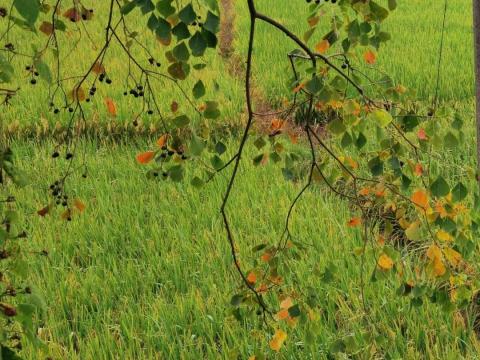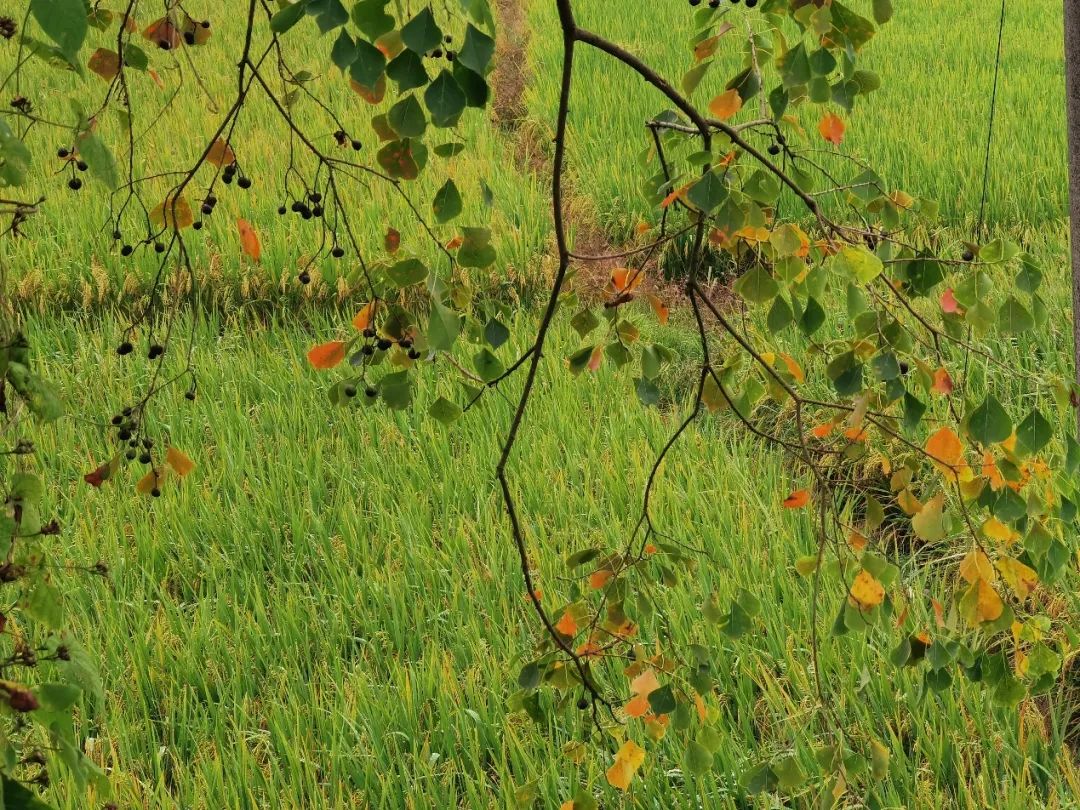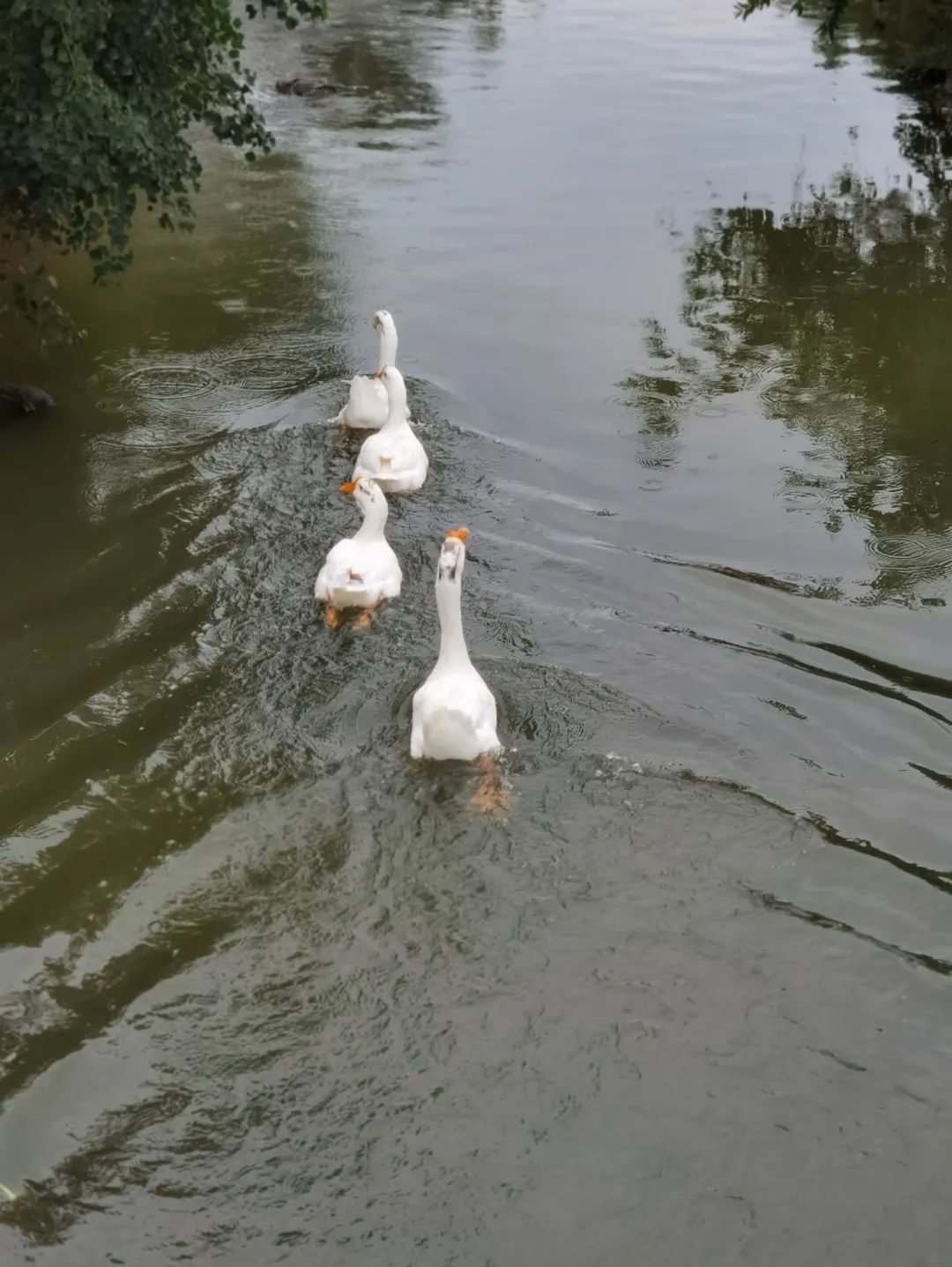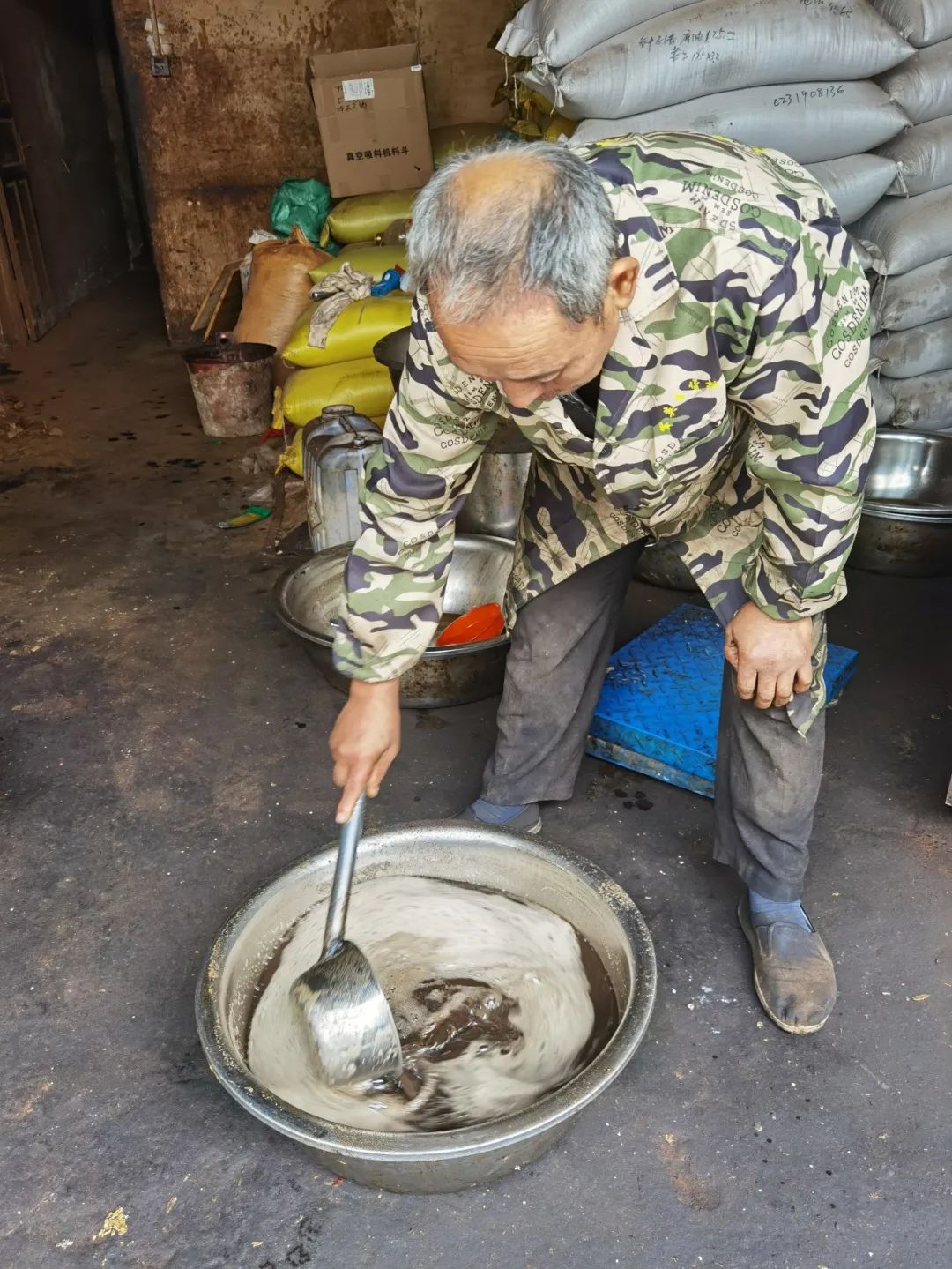
On this day, the autumn rain in Muxi Reservoir was misty, and the golden fields were covered with a curtain of fog. I thought about going to the town to get some medicine, so I held an umbrella, carried a water bottle on my back, and walked to the local market town - Gu port.

Jin Mei, the cook at the reservoir, kindly reminded me that I have to walk straight along the "Mujiu Canal" under the reservoir to reach the ancient port. I went down along the reservoir dam and turned northeast at the village entrance of Yaojiaban. Wandering slowly along the way, if you see someone you are interested in, you will stop to take pictures or ask questions. You will be full of curiosity along the way.

Although the scenery on the road cannot be said to be picturesque, in the golden autumn of October, the rice fields are golden, grapefruits are hanging on the treetops in the villages on both sides of the road, and lentils, shrimp beans (a variety of lentils) and pumpkins are everywhere on the roadside. It is growing on the ground by the roadside, blooming and bearing fruits at the same time.

The clear water of the canal has been flowing down with me. In the clear water canal, white geese, twist-colored fat ducks, and groups of ducklings are all playing and foraging freely in the water. I chased and photographed many of them. figure.

I encountered a few interesting things on the way, recorded them and shared them with everyone:
1
An ancient town by the Xinjiang River
Gubu Town is located in the eastern part of Yugan County, Jiangxi Province, at the junction of Yugan, Poyang and Wannian counties, on the banks of the Xinjiang River, about 13 kilometers away from the county seat.
The word "bu" in ancient port is explained in the dictionary as a dock where ships stop. It is said that in the early Song Dynasty, Yao surnamed Poyang moved here to set up a commercial port. Because the village was located next to an ancient road, it was called "Gulu Port". Later, buildings were built in the village and it was renamed "Gulu Port", or simply "Gulu Port".

The ancient port has "two mountains, two rivers and five fields, as well as roads and manors." The town is surrounded by mountains and rivers, with beautiful mountains and rivers everywhere; the fields are rich in products, and the ancient town has outstanding people; it was also the seat of the ancient port branch of the Communist Party of China in 1927. An integral part of the Red Revolutionary Base Area in Northeast Jiangxi. The local area is rich in rice, cotton, ginger, water chestnuts, lotus root, aquaculture, etc. It is the trade center of Yuqian and Wannian, and both Changwan Highway and Yugu Highway pass through this place.

The town covers an area of about 118 square kilometers, governs 25 administrative villages, and has a population of more than 60,000. It is a large town. In my impression, this town has never been annexed.

I only stayed in the town for more than an hour, and I felt that rural towns all looked the same: criss-crossing streets and rows of shops on both sides, no different from market towns in other parts of Jiangxi. I just heard some people talking here, which made me laugh. He has an obvious Wannian County accent, probably because he is not far from Wannian County.

2
Water chestnuts growing in the field
In Yuandun Village, I saw a few old farmers standing at the intersection. They had a small patch of lush water chestnuts (also known as horseshoes) growing next to them. I took pictures of them, and they laughed and said I couldn't take pictures because taking pictures would make the water chestnuts stop growing. I knew they were joking, so I stopped to chat with them. They told me that water chestnuts are a high-yielding cash crop that grows in paddy fields. The maximum yield per mu can reach 2,500 kilograms. Nowadays, there is no organic fertilizer and chemical fertilizers are generally used, so the water chestnuts grown are not as delicious as before.

After the water chestnuts are dug out and washed, the wholesale price is 2 yuan per pound, and retailers sell them for 3 to 4 yuan. Although water chestnuts have a high yield, labor costs are high. When planting, the seedlings must be hatched first, and then planted separately after they grow into seedlings. After planting, you must also manage it with special care, weeding, fertilizing, and keeping it away from water. Harvesting is more difficult. In winter, manual hands are required to carefully pull them out of the soil one by one.

They grow whip-like root systems from the ground. The main stem does not grow water chestnuts, but the underground whip stem grows water chestnuts. The growth method is different from that of taro.

I asked about the other two plants, rushes and mats. They said that mats are longer and have joints, and few people grow them in this area; while water chestnuts are hollow and thicker; rushes are thinner and still solid. . In the days when there was no electricity, rush wicks were commonly used as wicks for vegetable oil lamps. A small amount of vegetable oil was put into a small lamp, and a wick was placed. After the wick was full of oil, it could be lit. It was used to illuminate intersections at night. Several old people in the room said they had used it, but the two young people standing aside said they had never seen a vegetable oil lamp lit with a wick. They only remembered seeing a kerosene lamp with a glass cover when they were children.


Water chestnuts are cooling and detoxifying, and can cure coughs. I once tried eating water chestnuts to treat throat discomfort. If the throat is red, swollen or uncomfortable, I can eat a dozen raw water chestnuts and the effect will be immediate the next day.

3
Meet a 93-year-old old lady
I continued walking along the canal and arrived at the site of Ninggang Village. I saw several old ladies at the intersection supporting another older woman who looked older, and there was also a strong man among them. I thought there was a car accident, but after asking, I found out that the 93-year-old woman in the middle had Alzheimer's disease. She walked a long way to the entrance of the village alone and said she would insist on walking outside. Three elderly people in the village, two in their eighties and one in his sixties, gathered around the intersection to persuade her to go home.

It happened that his youngest son came on a motorcycle and told her to go back, it was going to rain. The old lady said she was going to her daughter's house, but others said her daughter had gone to work and was not at home. While pushing the motorcycle, the son helped the old lady walk home. It seemed that he was holding the motorcycle with one hand and it was not convenient to support the old man with the other hand, so he rode the motorcycle back, walked over from a long distance, and picked it up from a neighbor. I passed the old man and used a mask to wipe the phlegm from the corners of my mother's mouth. I praise him for his filial piety. He is truly blessed to have such a good son, and he will set an example of filial piety to his children.

He said that when his mother gave birth to her son, Cankaixiaoxiao, and raised her son, it was not just to provide for him in old age, so he should serve his mother. He supported his mother and walked home slowly. The old lady was in good spirits and could walk so far, but she was a little confused.

Although she has several sons who take turns supporting her and live with each family for a year, it can be seen from her clothes, neat clothes, clean leather shoes, and the filial piety of her children that this old lady is happy. Several elderly people in the village said that her daughter-in-law was also very kind and took good care of the old lady. Such filial children are worthy of praise!

Seeing the young man helping his mother walk home, I felt warm in my heart. This situation reminded me of two stories I heard at the reservoir:
One is an old man in the village next to the reservoir. He lives alone and has been sick and lying at home for several days. No one cares about him. He doesn't even have a sip of hot water, let alone a meal. Or are the neighbors displeased and telling their grandson that you don't care about the old man being sick? Is that fair? Only then did someone take him to the hospital.
In another village by the reservoir, there was an old man who lived alone in an old house and ate with his son and daughter-in-law. Later, his son went out to work, and the old man had three meals a day at his daughter-in-law's new house. Since meal times in rural areas are not fixed, if the old man does not come to eat on time, his daughter-in-law will yell at him. Sometimes when I arrive a little early, my daughter-in-law scolds me, "I know how to eat all the time, but here I am before the meal is ready." , sometimes he would come a little late, and he would scold me as "I'm so old, I don't rush to eat". Later, the old man got angry and cooked food by himself. Later, I heard that the old man committed suicide. How sad!
It is rare to see the elderly being taken care of by their filial sons and daughters today. I hope that young people in rural areas will be like this old man and treat the elderly who have lost their labor force kindly. The elderly in rural areas can have support and support in their old age, so they will not be so pitiful.

4
Master Yang's old house
Next to a new house on the left side of the canal, I saw an old house that is no longer common in the countryside. This is the architectural style of farmers' houses that I saw most in Yugan when I was a child. So I stopped and took pictures. The old man standing next to me asked me what I was doing. I said I was going to the ancient port. I was passing by and saw your house was beautiful, so I took some photos.
His surname is Yang, and he is retired from the supply and marketing cooperative. The old house was built by him in the early 1980s. It is an all-wood structure and faces south. A wall on the east side has been demolished, and the frame inside can be clearly seen. There are also plaster walls.

The old man said that at that time, they used to live under the mountains. Due to frequent floods, the villagers moved to the hills one after another. It was not easy to build a house back then. The first is the foundation issue. It is easier to get up first and occupy a good place first. The people who came later had no foundation, so they had to exchange their rice fields for homesteads with other people's homes.

There was a foundation, but there was no wood. Reinforced concrete structures were not popular at that time, and there was nowhere to buy these materials, so everyone had no choice but to choose wooden structures. Yugan is a water town and does not produce wood. You can only buy it in Wuyuan, Dexing and other counties with big mountains. But at that time, mountainous counties had strict control over timber transportation, so some people went to "smuggle" (actually smuggled wood). They took the two wheels of the cart to mountainous counties, bought fir trees they cut down from local farmers, tied them to the wheels and walked back. When they encounter an official "bamboo checkpoint" on the way, they have to try to escape because the government has explicitly prohibited the flow of wood in mountainous areas, so they mostly walk at night. They can only pass through the "bamboo checkpoint" when the personnel at the "bamboo checkpoint" get off work. It's really difficult. easy.

The locals still cannot afford to buy fir trees, so they can only buy dismantled wood from old houses brought by vendors from the mountains, renovate and reuse it, and the price of that wood is relatively cheaper.
The walls inside the old house are made of bamboo strips and are fixed as a baffle. Then a layer of mud and straw is used to paste it. After the mud dries, a layer of white lime is then powdered on top. The snow-white walls remain today. Keep it intact.

Master Yang talks about his work in the supply and marketing cooperative with pride. He said that supply and marketing cooperatives are a place where money and goods are managed, and corruption mistakes can be made if you are not careful. "Everyone wants money, but the problem is to get through." He said that the leaders' investigation of corruption at that time was not like auditing accounts now. They just calculated your family's income and expenses. If they were even, it was normal. If your expenditures are more than your income, then the extra money will be your unexplained money, which is a crime. In the light case, you will be criticized and in the serious case, you will be jailed.

Therefore, he worked in a disciplined manner and never made any mistakes. He is still enjoying his retirement at home with his retirement salary and is happy.

5
Oil press shop in ancient port
After finishing some errands on the streets of Gubu, I took shelter from the rain under a roof and saw the masters pressing oil nervously in the oil-pressing workshop in the town.

This oil shop is located in two stores opposite Gubu Junior High School. A couple in their fifties and a helper are pressing oil for the farmer who comes to process peanut oil.

The entrance to a store on the left is used to place a roasting machine. Peanuts, rapeseeds and sesame are all roasted here. There are also many bags of oil-pressing raw materials - sesame, rapeseed and peanuts - piled on the side. The helper filled the dustpan with peanuts and poured them into the machine. Firewood was used to heat the bottom of the machine. After about ten minutes, he put a flat bamboo stick into the converter and took out some peanuts to see if they were cooked. If they were cooked, he started a device to fry the peanuts. of peanuts poured out.

The scalding peanuts are placed in a container and poured directly into the oil press in a store on the right. This machine is electric. After the peanuts are poured in, the power is turned on and the oil begins to be squeezed. Peanut oil gurgled out from a hole on the right side of the machine, and the oil residue under the machine also fell piece by piece. The master shoveled off the first few pieces, and then shoveled the remaining pieces into the machine and continued to squeeze them again. , there may still be oil in the oil residue, so avoid waste.

While the machine was spinning to extract oil, the master put the oil in a basin on the ground that had been squeezed just now, and poured boiling water mixed with a little salt into it, saying that it was to speed up its precipitation. After stirring, the foam floats and then begins to settle.

On the other side is a filter. The filter seems to be a big bucket. After pouring the hot oil, start the machine and it will automatically filter. After a while, the clear and fragrant peanut oil will flow out from the bottom of the big bucket.

The farmer next to me was waiting for the peanut oil to cool down next to another basin of filtered peanut oil. After it cooled down and there was still a little bit of warmth, he started pouring the oil into his oil can, ready to take it home. He said that about four pounds of peanuts are used to squeeze one pound of peanut oil.

I have seen the old-fashioned oil press, which is a large tree with a diameter of nearly two meters. The middle is hollowed out to form a rectangular hollow. The fried and crushed peanuts and other oil raw materials are put into a bag wrapped in straw to form a cake. Put it into an iron hoop, fold it upright and put it in the middle of the oil press. Add wooden plugs at both ends. When it is almost full, there is a little gap left, stuff it with a wedge-shaped wooden plug, and then hit it with a huge hammer to make the wood The plug is gradually squeezed into the oil press, squeezing out all the oil in the iron hoop and leaking into the basin from below. This old-fashioned oil press is majestic and loud, but also wasteful. We loved to see it when we were kids.

A sign at the entrance of the oil shop reads the price of cooking oil: rapeseed, 320 yuan for one hundred pounds. Rapeseed oil costs 12 yuan per catty, sesame oil costs 25 yuan per catty, and peanut oil costs 20 yuan per catty.

If processed with supplied materials, there is no charge for peanuts and rapeseeds. The reason is that the pressed oil residue is used by the oil mill to pay wages. The oil residue is returned to the oil mill and sold to pig farmers and fertilizer makers. Peanut oil residue is 1.5 yuan per catty, and rapeseed oil residue is 1 yuan per catty. Because the oil mill has income, there is no charge for pressing oil from these two types of raw materials. However, the sesame processing costs 10 yuan per pot because the amount of sesame seeds is too small and there is not much oil residue. However, no matter how much sesame comes, the oil shop has to fry it in one pot. Often those who process sesame oil don’t have enough for one pot, so they charge 10 yuan per pot for processing to supplement the cost of oil extraction.

It was 8 kilometers one way from Muxi Reservoir to Gubu. I walked back and forth. Although I felt a little tired, what I saw and heard along the way made me deeply appreciate Yugan's water town scenery and local folk customs. I felt that Muxi Reservoir was indeed It is a rare place for leisure, travel and home life. I hope it will become better tomorrow.

